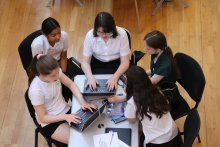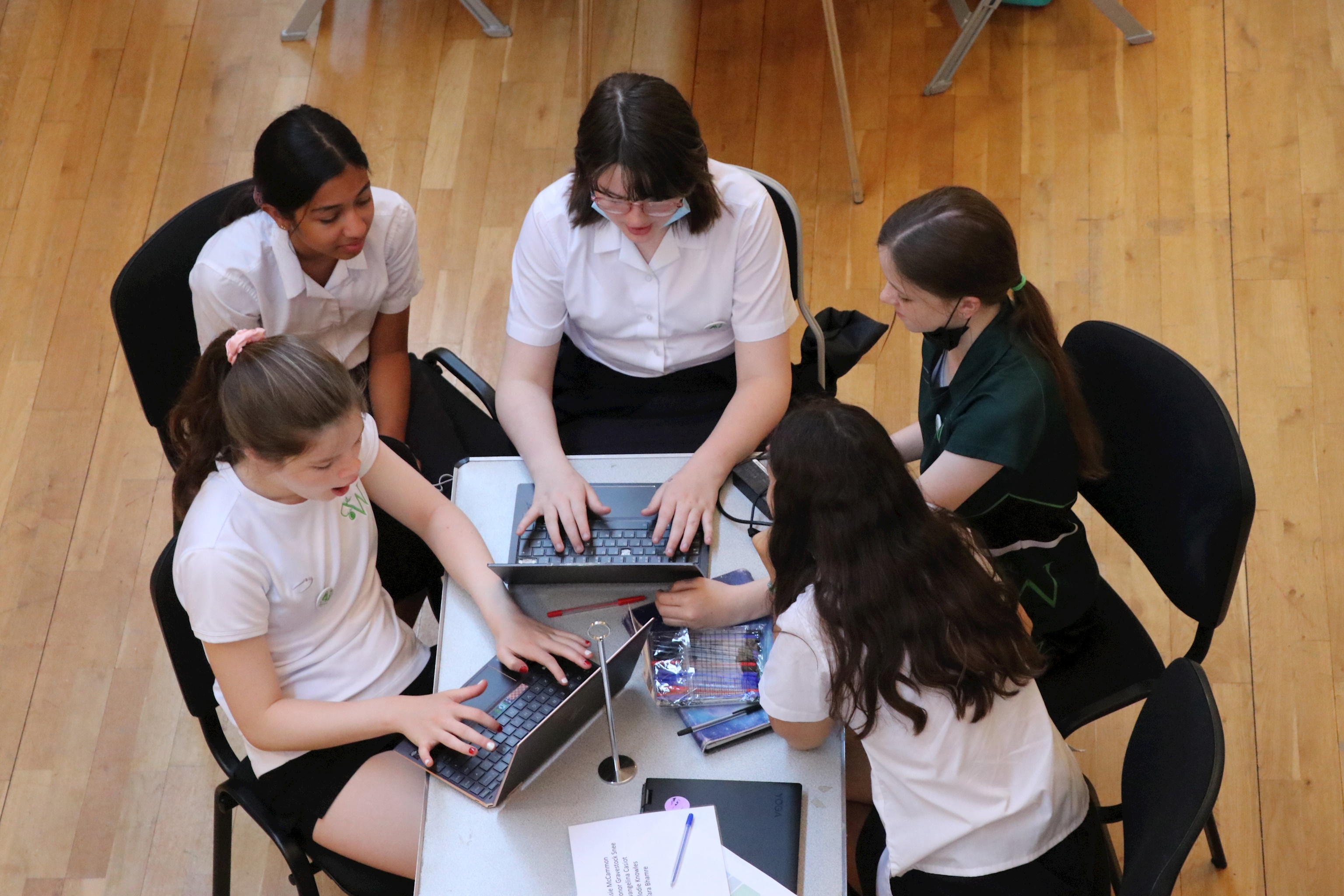#SchoolStories
See our latest stories and follow us on social media

At the end of May, we wrote about our AI BUILD day, when the whole of Year 8 worked in teams to build environmental monitoring devices using Arduino circuit boards. The day was part of a project to investigate and tackle the real-world problem of climate change by investigating our energy use at school, using our own data as well as publicly available large data sets.
Our monitoring devices spent two weeks gathering data on temperature, light levels and the movement of people at strategic points around the school site. In the meantime, Computer Science lessons covered the principles of data science and experimenting with the coding platform Kaggle.
Throughout the project our teachers have worked with biologist and data scientist Dr Nicole Wheeler and we were thrilled that she was able to join us in person for our AI CODE day on Monday 14 June. Dr Wheeler shared her own inspiring career story, telling the girls how she had taught herself the coding skills she needed for her work on infectious diseases. We learned how important coding and data science are in many areas of academic research, not just limited to computer science. Her passion for sharing her work shone through – we are not surprised to hear that she recently won an award for public engagement in science! You can learn more about her work here.
The pupils then set to work on three challenges, solving puzzles and ciphers to allow them to complete code in Kaggle which combined three sets of data. When the problems seemed impossible, the Computer Science teachers and Dr Wheeler were there to help, but we were all impressed by the way the girls persevered to solve problems without our help. Year 8 learned about the value and difficulties of our chosen data: all London smart meter data for electricity, our own school electricity consumption from Energyspark and the readings – taken every second! - from our own eight monitoring devices. The code allowed the girls to combine hundreds of thousands of points of data – to see, for instance, the movement of people around the site against electricity usage:

Other challenges revealed predictions from the AI forecasting tool Prophet - how accurate might they be? Dr Wheeler and Dr Roper talked with the girls about the need to understand the data that has been used in order to know how well the forecast might work. For instance, the graph on the left shows predicted use over a week, skewed by half term when the school has far fewer people: the forecasting AI averaged the readings instead. The girls concluded the right-hand graph of a daily prediction was far more accurate:

During the day, Year 8 also had talks on effective project management and teamwork, and a fun quiz on eco-facts, when we were all astonished to learn that our annual school electricity usage is enough to power 270 homes. The day concluded with the twenty-four teams creating a presentation showing their findings, and most importantly, recommendations for us as a school about areas for action or further investigation about our energy consumption. The project is not over yet: in class the pupils will complete their video presentations explaining their work.
The project isn’t over for the teachers either. This has been a truly ground-breaking piece of work which we could not have achieved without our partnership with Dr Wheeler. She brought the data science skills which we needed; we brought the classroom experience and curriculum knowledge to build a truly interdisciplinary STEAM+ project. In the longer term, we plan to continue to develop the project materials with Dr Wheeler, to share with other schools and organisations far and wide, promoting understanding and developing young people’s skills in this vital area.
There is a lot of discussion about ‘future skills’ in schools and the importance of AI, but many projects available are ‘one-off’ events or discuss the social issues of AI without addressing the data science. Our approach to AI is threefold – how we teach about it, how we teach with it and how we teach the skills needed to design and use AI systems. This long-term, indisciplinary and curriculum-based project is firmly in the last category, preparing Wimbledon High girls to stride out into the exciting and important world of AI and data science.
What the pupils had to say:
On Monday we took part in an AI code day. We discovered and learnt lots about coding and plotting graphs using the programming language Python, as well as learning how to interpret data from graphs. We also learnt about what AI is and how to effectively manage a project. Our understanding about what AI has changed. We used to think AI was simply computers having the ability to understand actions that take place, however now we realise how AI essentially comes from huge amounts of data, where computers will learn thousands or even millions of scenarios. They then base events that happen off these past examples. Something we discovered about the data we collected was that the school requires so much energy to remain fully functional, even when it wasn’t fully open. We felt that we gained many vital skills from this experience. Firstly, about how to manage a group, time management and how to play to everyone’s strengths. We also learnt about encryption and decryption, Python and problem solving. Overall, we found this project immensely fun as well as informative and we thought it was great to get to work so closely in a team to solve problems.
Holly M, Elodie L, Cecily S & Rebecca D, 8F
What has changed about your understanding of AI as a result of taking part in the day?
Many interpret things differently when hearing the term AI. To some Artificial Intelligence is about the supercomputers that large tech companies such as Microsoft or in fact the government use to process vast amounts of data or stimulate outcomes. Some think about biometric scanners and Face ID and how machine learning is used to identify you every time you open your phone. But what is crucial to recognise is that the practice of using and involving artificial intelligence within our world, whether in social media, online shopping or weather forecasting, relies on humans. It is with our input that data, the worlds most valuable resource can be processed and used to our advantage. People need to When teachers say that failure is a big part of success. Our progress didn't always glide smoothly, but joining each others' skills and assets played such a big role in this day, and it paid off.
Tell us one thing which you discovered in the data?
That most days, we don't turn the lights off after school!
Tell us one of your recommendations to the school as a result of your investigations:
Automated technology, lighting and heating. Although good habit is the most vital factor that will help us mitigate global warming and excessive energy usage, you can't always depend on humans. And thanks to technology we can introduce timed and self-switching off appliances around the school - taking a big step towards a greener school.
What skills do you feel you have learned from this experience which will be valuable to you?
Debugging and teamwork
Pola K, Caroline L, Heloise K, Imogen L & Mia K, 8R
